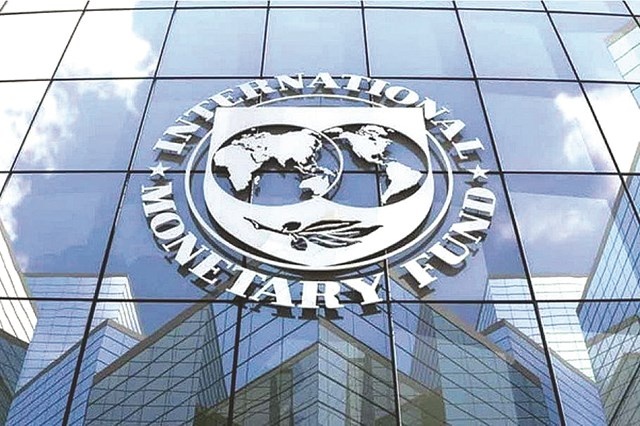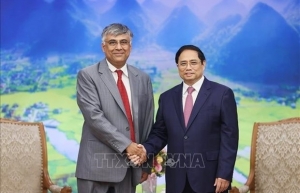IMF says Vietnam's fiscal policy should support the vulnerable
 |
According to the IMF, Vietnam experienced a strong post-pandemic economic recovery in 2022. GDP rose by a historically high 8 per cent, driven by strong domestic and external demand. Average inflation was contained at 3.2 per cent, although price pressures picked up steadily during the year.
The recovery was interrupted by strong external and domestic headwinds. Exchange rate pressures mounted throughout 2022 as global interest rates rose sharply. A major domestic bank suffered a deposit run and was placed under SBV’s control.
Financial stress among real estate developers, especially those highly leveraged, emerged and the corporate bond market froze. The economy was further hit by a sharp deterioration in external demand since late 2022, with exports declining by 12 per cent in the first five months of 2023. Liquidity and inflationary pressures have eased recently, but growth slowed down significantly in the first half of 2023.
“Vietnam’s economic growth is projected to recover in the second half of 2023, reaching around 4.7 per cent for the year, supported by a rebound in exports and expansionary domestic policies. Inflation is expected to remain contained below the SBV’s 4.5 per cent ceiling. Over the medium term, Vietnam can return to high-growth rates as structural reforms are implemented," Paulo Medas said.
In the short term, downside risks to growth remain large. Growth could disappoint if weakness in external demand persists or investment remains subdued. A deepening of the ongoing real estate and corporate bond market problems, along with rising non-performing loans, could harm banks’ ability to support growth.
“The measures taken by the SBV and the government have helped soften the impact of headwinds. Further efforts to safeguard macroeconomic and financial stability and accelerate reforms would ensure that the economy remains on a secure footing. The policy mix should be re-balanced with greater emphasis on fiscal support to the economy and the most vulnerable," he said.
The SBV was able to both contain price and liquidity pressures in a very challenging environment. Greater exchange rate flexibility and continued efforts to modernise the monetary policy framework would provide significant dividends. Further monetary policy easing, and measures to boost credit growth, at this stage will likely be less effective and more risky, given global rates are likely to stay high for long, and banks in Vietnam are already facing rising non-performing loans and high loan-to-deposit ratios.
“In this context, fiscal policy should take the lead in providing support to the economy and the poorest and most vulnerable groups, especially as the government has fiscal space," Medas said.
"The planned increase in spending (wages and public investment) and cut in taxes will help boost domestic demand. However, some tax cuts are regressive and have negative effects on the climate, such as car registration fees. Instead, given taxes are relatively low in Vietnam, the authorities could instead consider boosting spending to address infrastructure, strengthen the social safety net, and address other social needs. Further fiscal support should be considered, especially if the recovery disappoints."
Medas also highlighted that the current challenging economic environment and rising non-performing loans required the swift development of an action plan to protect financial stability and accelerate needed reforms. This would include strengthening the bank crisis management framework and improving bank regulation and supervision. The authorities should take advantage of the ongoing revision of the Law on Credit Institutions to develop more effective bank resolution and emergency liquidity frameworks.
Decisive actions to restructure the real estate sector and to promote a sound corporate bond market are warranted. The authorities have taken actions to reduce short-term risks, but more structural solutions should now be prioritised. In particular, the authorities should address legal bottlenecks that are impeding completion of real estate projects, strengthen the regulation and governance of the corporate bond market, and improve the debt enforcement and insolvency framework.
According to Medas, achieving Vietnam’s ambitious development and climate objectives will require accelerating reforms to improve the business environment, critical infrastructure, and invest in education.
Scaling-up social and infrastructure spending, including to meet Vietnam’s climate objectives, will require revenue mobilisation efforts. The authorities’ new plans on energy and climate are an important step forward, and the priority should now be on implementing concrete actions.
In addition, there has been a strong push in controlling corruption in recent years and continued efforts to improve governance and the business environment are welcome.
The Anti-Money Laundering / Countering the Financing of Terrorism framework also warrants strengthening. Efforts to reduce data gaps, including on the fiscal and external accounts, will help improve policymaking and generate greater economic benefits.
 | IMF expert considers Vietnam bright spot in world economy Vietnam’s 8 per cent growth in 2022 was a bright spot of the region and the world, said Daniel Leigh, head of the World Economic Studies division in the International Monetary Fund (IMF)'s Research Department, which produces the World Economic Outlook (WEO). |
 | IMF highlights rising debt risks for Asian companies The International Monetary Fund warns of increasing debt risks faced by Asian companies, with those in Vietnam among those at high risk. |
 | Prime Minister hosts IMF’s Article IV consultation team Prime Minister Pham Minh Chinh on June 29 received a delegation of the International Monetary Fund (IMF) headed by Sanjaya Panth, Deputy Director of the IMF’s Asia and Pacific Department, who are on a working trip in Vietnam for Article IV consultation. |
What the stars mean:
★ Poor ★ ★ Promising ★★★ Good ★★★★ Very good ★★★★★ Exceptional
Related Contents
Latest News
More News
- Tet event in Japan celebrates success of 14th National Party Congress (January 25, 2026 | 10:04)
- 14th National Party Congress wraps up with success (January 25, 2026 | 09:49)
- Congratulations from VFF Central Committee's int’l partners to 14th National Party Congress (January 25, 2026 | 09:46)
- List of newly-elected members of 14th Political Bureau announced (January 23, 2026 | 16:27)
- 14th Party Central Committee unanimously elects To Lam as General Secretary (January 23, 2026 | 16:22)
- List of members of 14th Party Central Committee announced (January 23, 2026 | 09:12)
- Highlights of fourth working day of 14th National Party Congress (January 23, 2026 | 09:06)
- Press provides timely, accurate coverage of 14th National Party Congress (January 22, 2026 | 09:49)
- Press release on second working day of 14th National Party Congress (January 22, 2026 | 09:19)
- Minister sets out key directions to promote intrinsic strength of Vietnamese culture (January 22, 2026 | 09:16)

 Tag:
Tag:



















 Mobile Version
Mobile Version